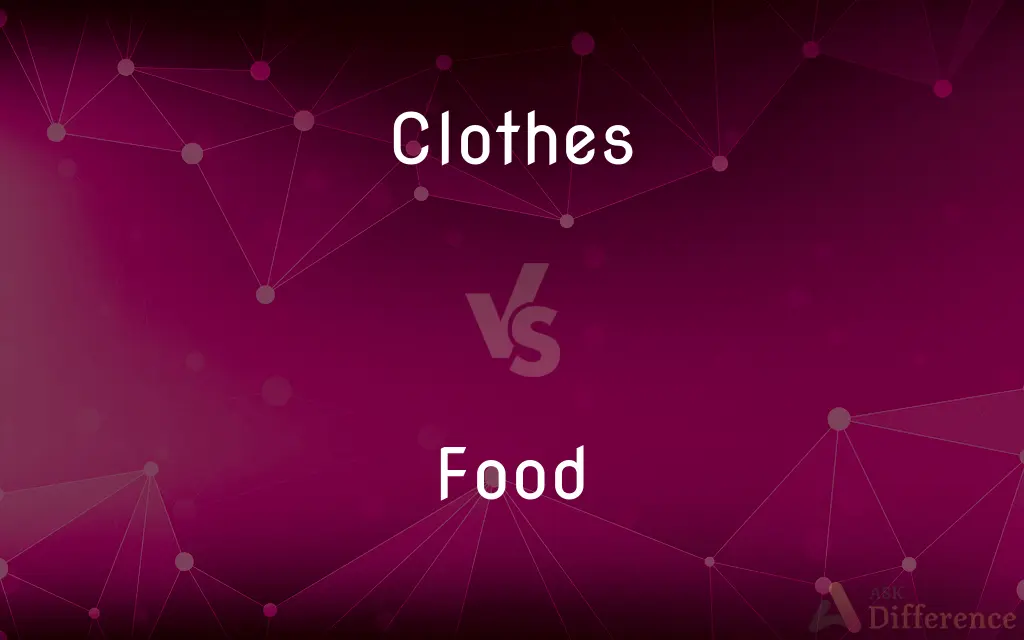Clothes vs. Food — What's the Difference?
By Urooj Arif & Fiza Rafique — Updated on April 16, 2024
Clothes are wearable items for protection and style, while food consists of edible substances necessary for human survival and health.

Difference Between Clothes and Food
Table of Contents
ADVERTISEMENT
Key Differences
Clothes primarily serve as protection against environmental elements and a means of expressing personal style, whereas food is essential for providing the nutrients needed for survival and health maintenance.
Clothes can vary widely in material, design, and function, reflecting cultural and personal tastes, while food varies in type, flavor, and nutritional content, influenced by geographical and cultural factors.
The fashion industry focuses on the creation, marketing, and sale of clothes, constantly evolving with trends and seasons. On the other hand, the food industry deals with the production, safety, distribution, and innovation of foods, aiming to meet consumption needs and preferences.
Purchasing clothes can be driven by desire, fashion trends, or social status, whereas purchasing food is primarily driven by nutritional needs, cravings, or culinary interests.
The environmental impact of clothes, particularly in fast fashion, includes significant waste and resource depletion, while the food industry impacts the environment through agriculture, food waste, and energy consumption in food production.
ADVERTISEMENT
Comparison Chart
Primary Purpose
Protection and personal expression
Nutrition and survival
Variability
Materials, design, fashion trends
Types, flavors, dietary needs
Industry Focus
Fashion design, trend setting
Food production, safety, distribution
Consumption Drivers
Style, trends, personal needs
Hunger, health, taste
Environmental Impact
Waste production, resource use
Agriculture impact, food waste
Compare with Definitions
Clothes
Apparel for specific occasions.
His wedding clothes included a custom-tailored suit.
Food
Ingredients used in cooking.
She bought fresh food from the market for tonight's dinner.
Clothes
Garments worn on the body.
She chose a bright dress and a warm jacket from her collection of clothes.
Food
Edibles that define cultural cuisine.
Traditional Japanese food includes sushi and tempura.
Clothes
Protective gear for different conditions.
They packed heavy clothes for the winter expedition.
Food
Substances consumed to provide nutritional support.
The meal included various types of food rich in vitamins.
Clothes
Fashion items reflecting trends.
The runway showcased clothes inspired by vintage styles.
Food
Emergency rations for survival situations.
They stocked up on canned food in preparation for the storm.
Clothes
Uniforms for professional or school use.
Her job requires her to wear specific clothes, including a lab coat.
Food
Products prepared for eating.
The restaurant serves organic food sourced locally.
Clothes
Items worn to cover the body
He stripped off his clothes
Baby clothes
A clothes shop
Food
Food is any substance consumed to provide nutritional support for an organism. Food is usually of plant, animal or fungal origin, and contains essential nutrients, such as carbohydrates, fats, proteins, vitamins, or minerals.
Clothes
Bedclothes
Rosie got into bed and pulled the clothes up to her nose
Food
Any nutritious substance that people or animals eat or drink or that plants absorb in order to maintain life and growth
Music is food for the soul
Baby foods
Food shortages
We need food and water
They had eaten their food and slept
Clothes
(plural only) Items of clothing; apparel.
Food
Material, especially carbohydrates, fats, and proteins, that an organism uses for energy, growth, and maintaining the processes of life. Plants, algae, and some bacteria make their own food through photosynthesis, while animals and most other organisms obtain food by consuming other organisms or organic matter.
Clothes
(obsolete) cloth.
Food
A specified kind of nourishment
Breakfast food.
Plant food.
Clothes
The covering of a bed; bedclothes.
Food
Nourishment eaten in solid form
Food and drink.
Clothes
Laundry (hung on a clothesline).
Food
Something that nourishes or sustains in a way suggestive of physical nourishment
Food for thought.
Clothes
Covering for the human body; dress; vestments; vesture; - a general term for whatever covering is worn, or is made to be worn, for decency or comfort.
She . . . speaks well, and has excellent good clothes.
If I may touch but his clothes, I shall be whole.
Food
(uncountable) Any solid substance that can be consumed by living organisms, especially by eating, in order to sustain life.
The innkeeper brought them food and drink.
Clothes
The covering of a bed; bedclothes.
She turned each way her frighted head,Then sunk it deep beneath the clothes.
Food
(countable) A foodstuff.
Clothes
Clothing in general;
She was refined in her choice of apparel
He always bought his clothes at the same store
Fastidious about his dress
Food
Anything that nourishes or sustains.
The man's inspiring speech gave us food for thought.
Mozart and Bach are food for my soul.
Food
What is fed upon; that which goes to support life by being received within, and assimilated by, the organism of an animal or a plant; nutriment; aliment; especially, what is eaten by animals for nourishment.
Food
Anything that instructs the intellect, excites the feelings, or molds habits of character; that which nourishes.
This may prove food to my displeasure.
In this moment there is life and foodFor future years.
Food
To supply with food.
Food
Any substance that can be metabolized by an organism to give energy and build tissue
Food
Any solid substance (as opposed to liquid) that is used as a source of nourishment;
Food and drink
Food
Anything that provides mental stimulus for thinking
Common Curiosities
Are clothes recyclable?
Many clothes can be recycled or repurposed, though recycling rates vary widely.
How often do fashion trends change?
Fashion trends can change seasonally and annually, influenced by cultural shifts and industry innovation.
What are the main types of food?
Main food types include carbohydrates, proteins, fats, vitamins, and minerals.
What is the role of cuisine in food?
Cuisine refers to a style of cooking practices and traditions, often associated with a specific region or culture.
Can clothes be a status symbol?
Yes, certain brands and styles of clothes can signify social status and personal wealth.
How does food impact health?
Food provides essential nutrients that impact overall health, growth, and disease prevention.
How is food security a global issue?
Food security involves ensuring that all people have access to sufficient, safe, and nutritious food at all times.
What are the primary functions of clothes?
Clothes serve to protect the body from environmental elements and express personal or cultural style.
What is the difference between organic and non-organic food?
Organic food is produced without synthetic chemicals or genetically modified organisms, unlike non-organic food.
How do dietary preferences influence food choices?
Dietary preferences can be based on health issues, ethical beliefs, or cultural practices, influencing what foods are consumed.
What materials are clothes made from?
Clothes are made from a variety of materials including cotton, wool, synthetic fibers, and more.
How do cultural factors influence clothing styles?
Cultural factors can dictate clothing materials, styles, and usage, reflecting religious or traditional norms.
What is fast fashion?
Fast fashion refers to cheaply produced and priced garments that replicate current fashion trends.
How does cooking affect the nutritional content of food?
Cooking can enhance the digestibility of food and availability of some nutrients, though it may reduce others.
Share Your Discovery

Previous Comparison
Functioning vs. Working
Next Comparison
Hurl vs. ThrowAuthor Spotlight
Written by
Urooj ArifUrooj is a skilled content writer at Ask Difference, known for her exceptional ability to simplify complex topics into engaging and informative content. With a passion for research and a flair for clear, concise writing, she consistently delivers articles that resonate with our diverse audience.
Co-written by
Fiza RafiqueFiza Rafique is a skilled content writer at AskDifference.com, where she meticulously refines and enhances written pieces. Drawing from her vast editorial expertise, Fiza ensures clarity, accuracy, and precision in every article. Passionate about language, she continually seeks to elevate the quality of content for readers worldwide.














































